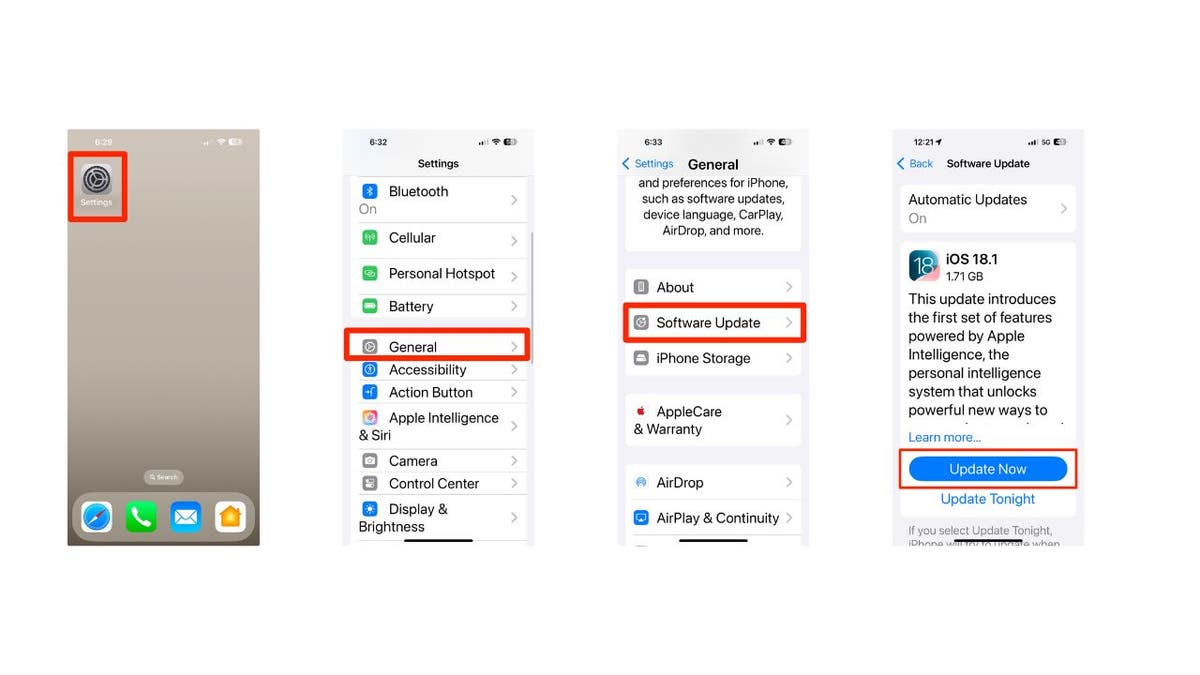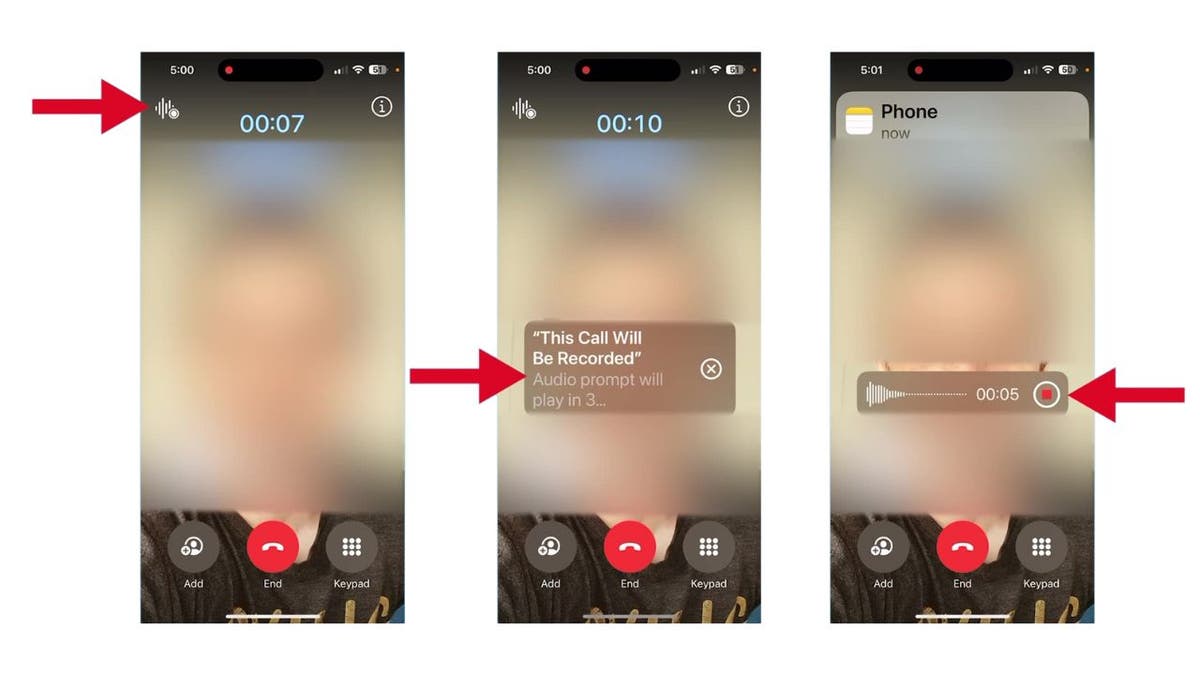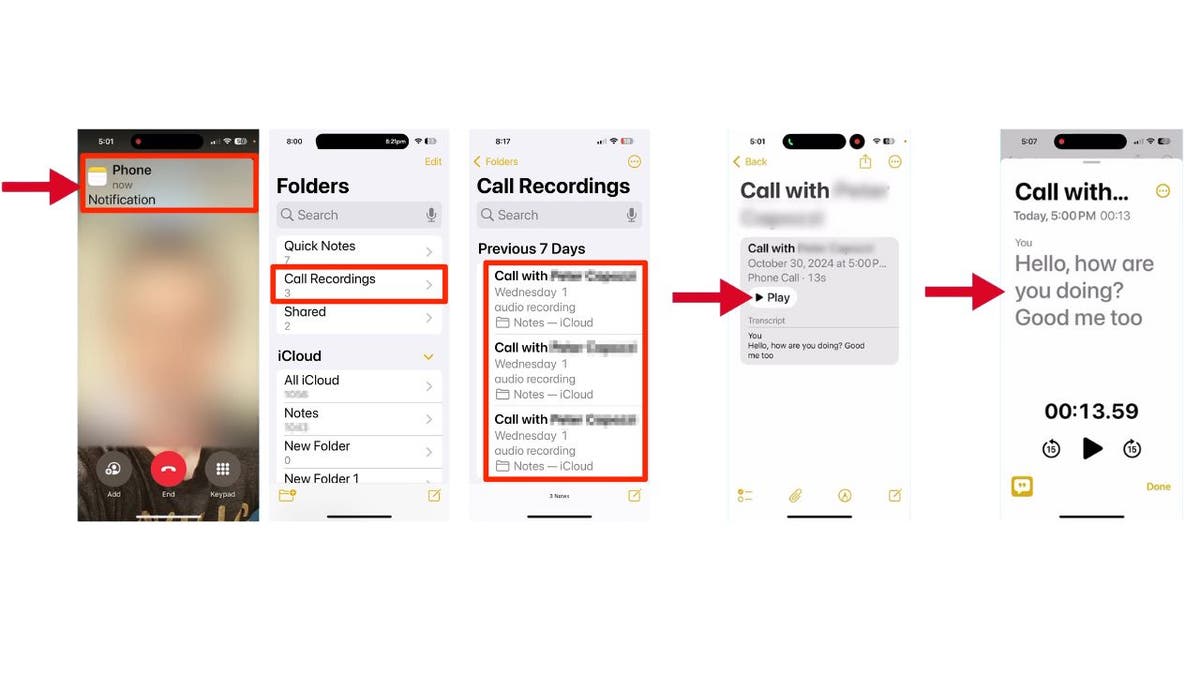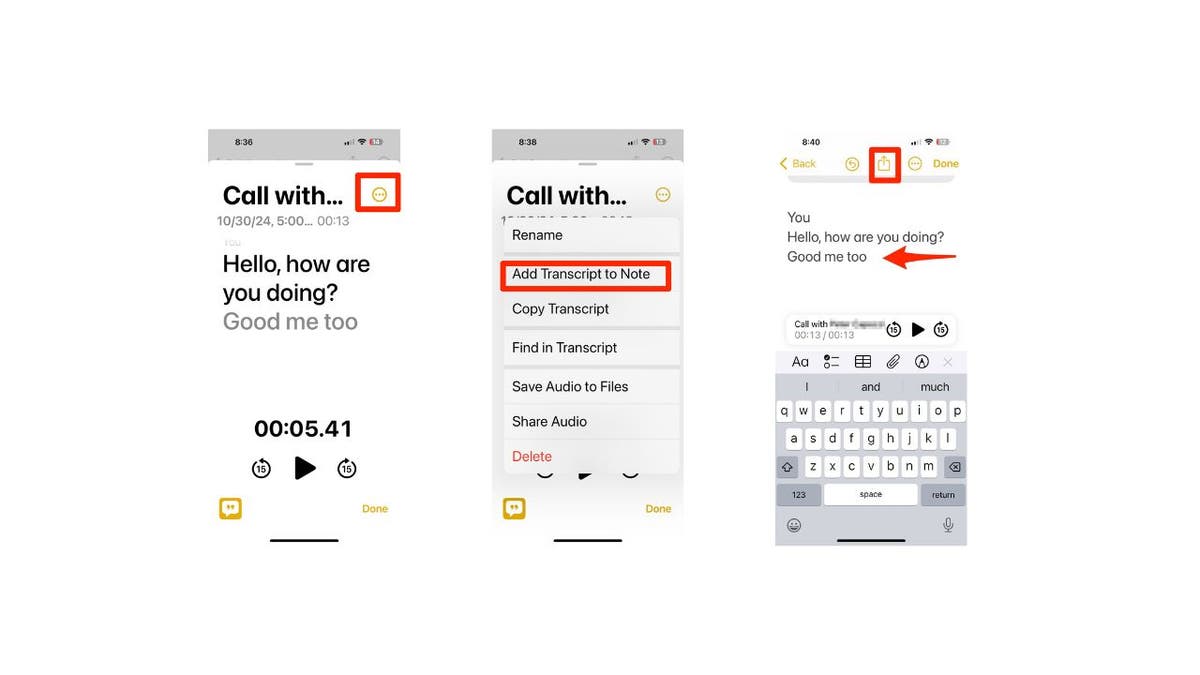Europe has an electric bike problem. Direct-to-consumer e-bikes from inexpensive Chinese brands like Engwe and countless others can be easily purchased online despite openly flouting EU restrictions. They feature throttles and powerful motors that can be easily unlocked to far exceed the 25km/h (16mph) legal speed limit — no pedaling required.
Technology
How to easily record phone calls on your iPhone

Remember when recording a phone call on your iPhone felt like trying to solve a Rubik’s Cube blindfolded?
Well, those days are officially over. With the release of iOS 18.1, Apple has introduced a native call recording feature as part of Apple Intelligence.
This new functionality makes it easier than ever to document important conversations. Let’s take a closer look at how this feature is changing the game for recording calls on our iPhones.
I’M GIVING AWAY A $500 GIFT CARD FOR THE HOLIDAYS
Native call recording feature on iPhone (Apple)
The legal lowdown
Before we get into the nitty-gritty of how to use this feature, let’s talk about the elephant in the room: legality. Recording phone calls can be a bit of a legal minefield, and the last thing you want is to end up on the wrong side of the law. Laws vary by state, so it’s crucial to do your homework and make sure you’re playing by the rules in your area. Remember, it’s always better to be safe than sorry.

Man recording a phone call on iPhone (Kurt “CyberGuy” Knutsson)
HOW TO PROTECT YOUR IPHONE & IPAD FROM MALWARE
What you’ll need to record calls on iPhone
Now that we’ve got the legal stuff out of the way, let’s talk about what you need to get started:
- An iPhone 15 Pro, iPhone 15 Pro Max, iPhone 16 or iPhone XS (or newer model)
- iOS 18.1 or later installed on your device
HOW TO SECURELY LOCK YOUR IPHONE AND IPAD FROM PRYING EYES
How to update your iPhone to the latest software
Not sure if you’re running the latest iOS? No worries! Here are some quick steps to update your iPhone:
- Open Settings
- Tap General
- Select Software Update
- If available, tap Update Now and begin downloading and installing iOS 18.1

Steps to update your iPhone to the latest software (Kurt “CyberGuy” Knutsson)
LET YOUR IPHONE READ ALOUD WHAT YOU CAN’T SEE
How to record a call on your iPhone
Now, let’s get to the fun part, actually recording a call. Here’s how it works:
- Start or answer a phone call like you normally would.
- Look for the new recording icon in the upper-left corner of the call screen.
- Tap that icon to start recording.
- You’ll hear a countdown from three seconds, followed by an audio message saying, “This Call Will Be Recorded.”
- A notification will pop up to let everyone on the call know that it’s being recorded.
- After the recording begins, a Notes notification will appear at the top of the screen to alert you that a new note has been created for this transcript.
- Hit the stop button to end the call at any time, you’ll hear another message saying, “This call is no longer being recorded.”

Steps to record a call on iPhone (Kurt “CyberGuy” Knutsson)
How to access your recording
After successfully recording your call, follow these steps to access and manage your recording:
- Look for a notification from the Notes app pointing you to the audio file and transcript.
- Tap the notification to open the recording directly in Notes or open the Notes app later to review.
- In the Notes app, find your recordings in a new folder called Call Recordings.
- Tap the note to review the transcript. Here you can: 1) Listen to the audio from the beginning by hitting Play; 2) Scroll down and tap within the transcript to start playback from a specific point; 3) Tap a sentence to start playback from there; 4) Pause playback at any time by tapping the play button.
WHAT IS ARTIFICIAL INTELLIGENCE (AI)?

Steps to access recording (Kurt “CyberGuy” Knutsson)
How to add a copy of the transcript to the note for editing
- Tap the menu button
- Select Add Transcript to Note
- Edit the transcript as needed, such as highlighting important sentences
- Share the recording by clicking the send button
- Tap Done

Steps to add a copy of the transcript to the note for editing (Kurt “CyberGuy” Knutsson)
Remember, you can always return to these recordings in the Notes app to review, edit or share as needed.
Kurt’s key takeaways
Whether you’re conducting interviews, keeping records for research or just want to remember important details from a conversation, it’s never been easier to record calls on your iPhone. However, with great power comes great responsibility. Always make sure you have the consent of all parties before recording a call and use this feature ethically and legally.
So, what do you think about this new feature? Are you excited to try it out? Let us know by writing us at Cyberguy.com/Contact.
For more of my tech tips and security alerts, subscribe to my free CyberGuy Report Newsletter by heading to Cyberguy.com/Newsletter.
Ask Kurt a question or let us know what stories you’d like us to cover.
Follow Kurt on his social channels:
Answers to the most asked CyberGuy questions:
New from Kurt:
Copyright 2024 CyberGuy.com. All rights reserved.

Technology
Engwe Mapfour N1 Pro e-bike review: the new ‘premium’

Here in Amsterdam, cheap Super73-knockoffs ridden at almost twice the legal speed have made the city’s renowned bicycle lanes increasingly chaotic and dangerous. Across the Netherlands, over 10,000 of these electric “fat bikes” were seized in 2024.
Engwe’s new Mapfour lineup is the company’s attempt at going legit by expanding from souped-up electric fat bikes and foldables into “premium commuter” e-bikes. And because they’re the first e-bikes that Engwe has designed exclusively for European roads, the company swears they can’t be unlocked for more speed.
I’ve been riding the new Mapfour N1 Pro model for the last few weeks. It lists for €1,899 (almost $2,000), or €1,799 during the initial launch — a price that brings heightened expectations.
The N1 Pro is slathered in premium capabilities like GPS/GSM tracking for which some bike makers charge subscriptions. The monocoque frame and fork are made from carbon fiber supplied by Toray — “the same high-quality carbon fiber as Trek and Specialized,” claims Engwe. There’s even turn-by-turn navigation built into the full-featured app, a large colorful display integrated into the handlebars, and a built-in mechanical lock in the rear wheel hub that automatically engages when the bike is turned off and stationary.
My review bike was missing a fender bolt, occasionally flashed a strange error code, and the solar-powered rear light won’t turn on. Still, it’s likely the highest quality electric bike Engwe has ever made.

$1714
The Good
- Looks and rides sporty
- Long list of features for price
- Removable battery
- Can’t be speed hacked
The Bad
- Strange error messages
- Servicing parts likely an issue
- Doesn’t support height range claimed
- Can’t be speed hacked
I have lots of experience with assembling direct-to-consumer e-bikes and the N1 Pro was ready to ride in about an hour, which is typical. Even with a carbon-fiber frame it weighs 20.1kg (44lbs) fully assembled according to my scale, which is heavy for an e-bike — just not Veloretti-heavy.

In the box you’ll find a basic toolset that includes everything needed for assembly and instructions written in stellar English unlike some previous Engwe tutorials I’ve read. I had to assemble the pedals, front wheel, kickstand, handlebar, and fenders, and fish out a replacement fender bolt from some spare bicycle parts I had lying around. I then went to adjust the saddle to my height only to discover that I was too tall for the N1 Pro.
The saddle stem has a marked safety line that stops well before the height needed for my 6 foot (183cm) frame, despite being sold in the Netherlands where I’m considered a short king. Nevertheless, exceeding the line by about 2.5cm (one inch) hasn’t made the saddle feel insecure, even when riding over rough cobblestones. Engwe claims the N1 Pro supports riders from 165–190cm, and is considering offering the option for a longer saddle stem at checkout based upon my feedback.
The N1 Pro’s geometry puts the rider into what’s essentially a mountain bike stance: a moderate forward lean with hands spread wide out in front of the body. That wrist and body angle combined with a rather stiff saddle are not ideal for riding long distances, especially in combination with a backpack that’ll put even more weight on the hands and derrière. I do like that fun, sporty posture over short distances, but if you’re looking for a more relaxed ride then Engwe has the upright €1,399 MapFour N1 Air available in both step-over and step-through frames.




The 250W mid-drive Ananda motor on the N1 Pro is nearly silent under the din of road noise, and the integrated torque sensor provides an intuitive pedal-assist at all speeds. It produces up to 80Nm of torque that lets me easily start from a dead stop in fourth gear (of seven) on flat roads, but testing on a hill with a gradient of about 15 percent required a start from first gear. Typically, I only needed to shift to a high gear when I wanted to use my leg power to propel the bike at speeds above the 25km/h motor cutoff.
Despite claiming a range of up to 100km from its modest 360Wh battery, my first test performed over a few weeks yielded just 23km off a full charge in near-freezing conditions. I usually rode in power setting three of five on mostly flat roads. The second test performed on a single warmer day improved the range to 27km with 28 percent charge remaining — or an estimated 36km if I had time to run the battery dry for a below average 10Wh consumed per kilometer travelled. The bike battery seems to suffer from idle battery drain of about 1-2 percent per day when parked inside my house.
Worrisome for a “premium” e-bike: on two occasions I saw an “09” error message flash on the display which Engwe is still diagnosing. Once, while starting the bike after it had been sitting outside in the rain for a few hours. Another time after riding home on a rain-soaked street while switching between the N1 Pro’s regular and high-beam lights. In the first case, a simple reboot cleared it and I was able to ride away fine, but the other time required riding home under my own power before it inexplicably cleared the next morning.
- The bike’s integrated display is readable in all lighting, and shows the remaining battery level, speed, power level, and even distance and direction of next turn if using the navigation built into the useful but overwrought Engwe app.
- I didn’t find Engwe’s turn-by-turn navigation very useful as the guidance presented on the display wasn’t informative or urgent enough for me to make confident decisions when traversing the dense network of crossroads in Amsterdam.
- It has a very loud alarm that can ward off thieves and help locate the e-bike in large parking garages.
- The daytime running lights are fun and help with visibility, but also dorky if you choose the animated options.
- The solar-powered rear light never worked on my review unit.
- Engwe provides a chain guard on shipping units.
- The hydraulic disc brakes from an unspecified vendor provide good controlled stops.
- Includes a 1-year warranty on electrical components, chassis, and battery.
1/19
There was a time when premium e-bikes had list prices around €2,000 / $2,000. Those days are as gone as the free venture capital propping up e-bike startups, pushing premium prices up to a starting price closer to €3,000 / $3,000. The Engwe N1 Pro is therefore priced about right. It’s not a bad e-bike, but it’s also not great despite checking off lots of features on a marketing sheet.
Just remember, servicing a direct-to-consumer e-bike can be a problem as it requires the ready availability of spare parts and the knowledge to replace them. As with any electric bike exposed to the elements and regular road use, the N1 Pro’s motor and any proprietary electronics like the controller, display, battery, lights, buttons, and integrated lock will eventually need servicing. So you’d better be on very good terms with your local bike shop or be handy with a wrench and oscilloscope to prevent your mail-order e-bike from quickly turning into e-waste.
Photography by Thomas Ricker / The Verge
Technology
Elon Musk’s SpaceX prepares for 8th Starship launch, pending FAA approval

Elon Musk’s SpaceX is preparing to launch the eighth flight test of Starship from Boca Chica, Texas, which could blast off as soon as this Friday as long as the Federal Aviation Administration (FAA) gives its approval.
“Starship Flight 8 flies Friday,” Musk, the CEO of SpaceX, said in a post on X Sunday.
For the first time, the upcoming flight has a planned payload deployment and multiple experiments on re-entry geared toward returning the upper stage booster to the launch site to be caught.
The launch will also include the return and catch of the Super Heavy booster that will blast the rocket off the launchpad.
STARSHIP UPPER STAGE LOST ON SEVENTH TEST FLIGHT, DEBRIS SEEN SPEWING IN SKY
Starship Flight 7 launches from Starbase, Texas, before its upper stage was lost. (Associated Press)
During the flight test, Starship will deploy four Starlink simulators, which are about the same size as next-generation Starlink satellites, SpaceX said.
The Starlink simulators will be deployed in the same sub orbit as Starship and are expected to burn up upon re-entry.
While Starship is in space, SpaceX also plans to relight a single Raptor engine.
POWERFUL WEBB TELESCOPE SPIES SPECTACULAR STAR BIRTH CLUSTER BEYOND THE MILKY WAY

Starship Flight 7 launches from Starbase, Texas. (Associated Press)
If all goes as planned, the launch window will open at 6:30 p.m. ET.
The launch comes more than a month after SpaceX launched Starship Flight 7 from the Starbase test site in Boca Chica, which resulted in Starship experiencing a “rapid unscheduled disassembly” nearly 12 minutes into the flight.
The Super Heavy booster descended back to Earth, where it maneuvered to the launch and catch tower arms at Starbase, resulting in the second ever successful catch of Super Heavy.
Starship, however, was not as successful.
MERGER OF MASSIVE BLACK HOLES FROM EARLY UNIVERSE UNCOVERED BY WEBB TELESCOPE, SCIENTISTS SAY
“Starship experienced a rapid unscheduled disassembly during its ascent burn,” SpaceX said in a statement Jan. 16. “Teams will continue to review data from today’s flight test to better understand root cause. With a test like this, success comes from what we learn, and today’s flight will help us improve Starship’s reliability.”
SpaceX has investigated what caused Starship to break apart, though the investigation remains open.
For Starship Flight 8 to blast off, the FAA must give its approval, which could come in a few ways.
In 2023, the FAA issued a five-year license to SpaceX for launches from Texas, which is revisited for every launch in case modifications need to be made for things like the trajectory of the rocket. The FAA could grant approval once mission specifics and license modifications are made, the FAA told Fox News Digital.
But also lingering is the open investigation into the Starship Flight 7 mishap. To fly again, the investigation needs to be closed, and the FAA must accept the findings. Specifically, the FAA weighs whether the incident put public safety at risk.
At the time of this writing, the investigation had not been closed, and the FAA had not given approval. Still, it is common for the approval to be issued a day or two before launch, the FAA noted.
SpaceX did not respond to Fox News Digital’s request for comment on the matter.
Fox News Digital’s Louis Casiano contributed to this report.
Technology
Longer-lasting laptops: the modular hardware you can upgrade and repair yourself

The goal, Patel says, is to continuously cycle through all of Framework’s actively supported laptops, updating each of them one at a time before looping back around and starting the process over again. Functionality-breaking problems and security fixes will take precedence, while additional features and user requests will be lower-priority.
-

 Technology1 week ago
Technology1 week agoVision Pro apps: the good, the bad, and the ridiculous
-

 News1 week ago
News1 week agoDominican officials cram thousands of inmates facing no charges into overcrowded prisons
-

 Politics1 week ago
Politics1 week agoTop federal agency exposed for spending billions on migrants in a single year
-

 Culture1 week ago
Culture1 week agoAre NFL players as college coaches here to stay? Why DeSean Jackson, Michael Vick can work
-

 News1 week ago
News1 week agoKamala Harris Has Scrambled the California Governor’s Race Without Entering It
-

 Culture1 week ago
Culture1 week agoBook Review: ‘Theory & Practice,’ by Michelle de Kretser
-

 Technology1 week ago
Technology1 week agoReddit vs. Wall Street: the latest in the GameStop saga
-

 Lifestyle1 week ago
Lifestyle1 week ago‘Modern Love’ Podcast: Why Gossiping Could Help Your Love Life

















